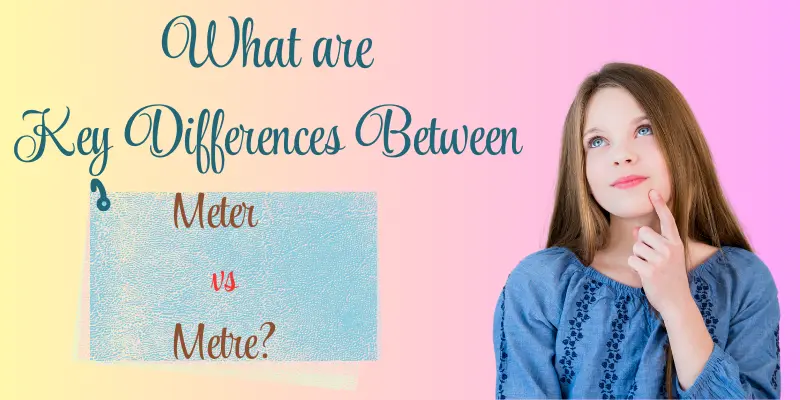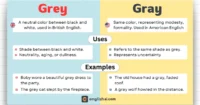Meter vs Metre – Key Differences in Spelling and Usage
Published: 25 Nov 2024
Ever stumbled upon the words meter vs metre and wondered if they mean different things?
You’re not alone!
The short answer is that they mean the same thing—a unit of length in the metric system equal to 100 centimeters.
However, the spelling difference reflects the type of English being used:
- Meter: Used in American English.
- Metre: Preferred in British English and other Commonwealth countries.
In this article, we’ll explore differences between meter vs metre, their proper usage, historical background, and much more to ensure you never mix them up again.
What is the Difference Between Meter vs Metre?

The key difference between meter vs metre lies in their spelling and regional usage:
- Meter is the standard spelling in American English.
- Metre is the standard spelling in British English and other forms of English outside the US.
Despite the variation in spelling, the pronunciation remains the same: /ˈmiː.tər/.
Where and How to Use Meter in American English
In American English, meter serves multiple purposes:
- Unit of Measurement: A meter measures length, forming the foundation of the metric system.
- Devices for Measurement: It also refers to tools like water meters, gas meters, and electricity meters.
Examples of Meter in Sentences
- The runner set a new record in the 100-meter sprint.
- Our household uses a smart electricity meter to monitor power consumption.
- Scientists use specialized meters to measure light intensity.
Where and How to Use Metre in British English
In British English, metre serves two main purposes:
- Unit of Measurement: Like a meter, it measures length within the metric system.
- Poetic Rhythm: It also refers to the rhythmic structure in poetry, known as poetic metre.
Examples of Metre in Sentences
- The swimming pool is 25 metres long.
- He effortlessly leapt over the two-metre-high fence.
- The poet carefully selected an iambic metre for their sonnet.
Meter vs Metre: A Comparison Table
| Aspect | Meter (US) | Metre (UK) |
| Spelling | American English | British/Commonwealth English |
| Meaning | Unit of length; measuring devices | Unit of length; poetic rhythm |
| Context | Technical, scientific, everyday use | Everyday measurements, poetry |
| Examples | 100-meter race, gas meter | Five-metre fabric, poetic metre |
A Brief Historical Context About Meter vs Metre
Why do these spelling differences exist? It all started with Noah Webster, an American lexicographer, who sought to create a distinct American English.
To simplify and standardize spellings, he changed metre to meter, along with other changes like color/colour and center/centre.
Meanwhile, British English retained its traditional spellings, including metre.
How to Choose the Right Spelling
Picking the right spelling depends on your audience:
- For American Audiences: Use meter for consistency.
- For British/Commonwealth Audiences: Use metre to align with their conventions.
Pro Tip: When writing for a global audience, stick with the preferred spelling of your target region.
When to Use Meter vs Metre in Poetry
While meter and metre often refer to measurements, in poetry:
- British English uses metre to describe the rhythmic structure of a poem.
- In American English, the poetic context is less common, but meter is still acceptable.
For example:
- Shakespeare’s plays often use iambic metre to create rhythm.
- The poet experimented with different metres to evoke emotion.
Meter vs Metre in Different Regions
1. Meter or Metre in Australia
Australia follows British English, so:
- Metre is used for the unit of length (e.g., 100 metres).
- Meter is reserved for measuring devices (e.g., water meter, electricity meter).
Examples in Australian English:
- The swimming pool is 50 metres long.
- The technician fixed the electricity meter yesterday.
2. Meter or Metre in Canada
Canada uses a mix of British and American English:
- Metre is the standard spelling for the metric unit of length.
- Meter is used for devices like gas or electricity meters.
Examples in Canadian English:
- The marathon was 42 kilometres, with markers every 500 metres.
- The new smart meter tracks energy consumption efficiently.
3. Meter or Metre in South America
In South America, Spanish and Portuguese are the dominant languages. However, in English contexts:
- Metre is often used for the unit of length due to British influence in scientific and international settings.
- Meter is still common in American-influenced contexts, especially for measuring devices.
Examples in South America:
- The football field measures 100 metres in length.
- The water meter was installed by the municipality.
Comparison Table: Meter vs Metre Across Regions
| Region | Unit of Length | Measuring Devices |
| USA | Meter | Meter |
| UK | Metre | Meter |
| Australia | Metre | Meter |
| Canada | Metre | Meter |
| South America | Metre (scientific use) | Meter |
Key Takeaways
- In Australia:
- Use a metre for length.
- Use a meter for devices.
- In Canada:
- Use metre for length.
- Use meter for devices, reflecting a blend of British and American influences.
This dual usage in Canada and Australia highlights their alignment with British spelling for measurements but adopts American conventions for devices.
Practical Applications of Meter vs Metre
In Everyday Life
- A meter is used to measure distances (e.g., in sports, construction, or travel).
- Devices like water meters and electricity meters track resource usage.
In Literature and Science
- In physics, the metre is a fundamental unit of measurement in the metric system.
- In poetry, metre refers to the rhythmic structure of verses.
Fun Facts About Meter vs Metre
- The metre was officially defined in 1791 by the French Academy of Sciences. It was based on the distance from the equator to the North Pole, divided by 10 million!
- Today, the metre is defined more precisely: the distance light travels in a vacuum in 1/299,792,458 seconds.
Conclusion: Meter vs Metre—Which One Should You Use?
Understanding the difference between meter vs metre boils down to regional spelling preferences and context. In short:
- Use meter in American English for both length and devices.
- In British/Commonwealth English, the metre is used as the unit of length and poetry, while the meter is reserved for measuring devices.
No matter where you are—whether it’s Australia, Canada, South America, or elsewhere—the key is knowing your audience.
By choosing the correct spelling, you can ensure clear communication, whether you’re writing for scientific purposes, crafting poetry, or simply discussing distances.
Quick Tip: If unsure, check the audience’s preferred English variant or refer to the style guide you’re following!
Next time you come across these words, you’ll know exactly which one to use!
FAQs
1. What is correct, meter or metre?
Both “meter” and “metre” are correct, but the choice depends on where you’re using them:
- Meter is the preferred spelling in American English.
- Metre is used in British English and many other English-speaking countries.
So, the right one to use depends on your audience or where you’re writing!
2. Is it meter or metre in India?
In India, “metre” is the preferred spelling for the unit of length, following British English conventions. However, you’ll also see “meter” used in some contexts, especially when referring to measuring devices like water meters or electricity meters, influenced by American English.
3. Are both spellings acceptable in global scientific writing?
Yes, but consistency is crucial. Use metre for international audiences unless writing specifically for American readers.
4. Why does South America have mixed usage?
English usage in South America is influenced by both British and American standards, depending on context (e.g., international collaborations favor metre, while local adaptations may use meter).
5. What about devices like gas or electricity meters?
Globally, meter is almost always used for devices, regardless of the region.

- Be Respectful
- Stay Relevant
- Stay Positive
- True Feedback
- Encourage Discussion
- Avoid Spamming
- No Fake News
- Don't Copy-Paste
- No Personal Attacks



- Be Respectful
- Stay Relevant
- Stay Positive
- True Feedback
- Encourage Discussion
- Avoid Spamming
- No Fake News
- Don't Copy-Paste
- No Personal Attacks





